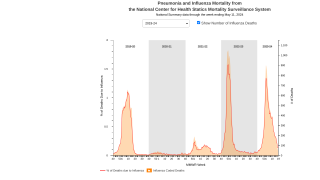Miscarriage and Flu Shot Study Critiqued by the CDC

When new research was published indicating a relationship between miscarriages in women who had received the flu vaccine, the Centers for Disease Control and Prevention (CDC) was quick to clarify this confusing issue.
This study found that women vaccinated early in pregnancy with an influenza vaccine containing the H1N1 (H1N1pdm09) component and who had also received the H1N1pdm09 vaccine component the previous season, had an increased risk for spontaneous miscarriage.
While most miscarriages occurred in the first trimester, several occurred during the second trimester. The median gestational age at the time of miscarriage was 7 weeks.
This 2015 study does not quantify the risk of miscarriage and does not prove that the flu vaccine was the cause of the miscarriage.
There are ongoing investigations to study this issue.
Earlier research studies have not found a link between flu vaccination and miscarriage.
"This study has raised many questions from customers that shop at my pharmacy. Although the study indicated there may be some association it did not provide a direct causal link,” said Dr. Mark Comfort, PharmD, Clinical Community Pharmacist at H-E-B Pharmacy, in Austin, TX.
“In addition, this study had some major flaws and more research is needed before we can change our recommendation.”
“Because pharmacists do know the danger influenza (the flu) poses to pregnant women and their developing babies, I still recommend to my pregnant patients that they receive the flu vaccine at any stage of their pregnancy," said Dr. Comfort.
CDC cited studies that examined the effects of influenza vaccination of pregnant women and their infants, including a 2013 study which found no increased risk of pregnancy loss among pregnant women in the four weeks after receiving a flu vaccine during the 2005-2006 and 2006-2007 flu seasons.
Additionally, the CDC cited a large study using data (Kharbanda et al, 2013) which found no increased risk for adverse obstetric events (like chorioamnionitis, pre-eclampsia, or gestational hypertension) for pregnant women who received the flu vaccine from 2002 to 2009 when compared to pregnant women who were not vaccinated.
At this time, CDC and its Advisory Committee on Immunization Practices have not changed the recommendation for influenza vaccination of pregnant women.
The official CDC recommendation is that pregnant women get a flu vaccine during any trimester of their pregnancy.
The CDC recommends that any pregnant woman who has questions about vaccines talk to her healthcare provider.
Doctors, nurses and pharmacists should use their clinical judgement based on various factors including their patient’s health status, local influenza activity, and the benefits versus the potential risks from flu vaccination when recommending to their patient to immunize, or not.
Most pharmacies offer several flu vaccines.
The cost varies depending upon your insurance and which state you live.
The CDC Vaccine Price List provides the private sector vaccine prices for general information.
Our Trust Standards: Medical Advisory Committee
- Flu Vaccination & Possible Safety Signal
- Association of spontaneous abortion with receipt of inactivated influenza vaccine containing H1N1pdm09 in 2010–11 and 2011–12
- Trivalent Inactivated Influenza Vaccine and Spontaneous Abortion
- Inactivated Influenza Vaccine During Pregnancy and Risks for Adverse Obstetric Events


























